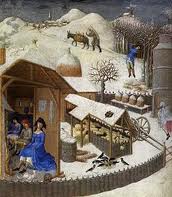The Impact of Climate Change on Late Medieval English Culture
Linnéa Shekinah, Rowlatt
Master of Arts, Centre for Medieval Studies, University of Toronto (2010)
Abstract
This MA thesis scrutinizes metaphors used by the late medieval English in order to explore the cultural response to climate anomalies of varying severity prefacing the Little Ice Age. The thesis indicates that changes in these cultural expressions marked a transformation in late medieval English writers’ conceptions of the natural world and their relationship to it. The central hypothesis is that repeated, long-term unreliable and uncertain weather conditions, and the resulting material insecurities and losses, stimulated a fundamental cultural response which reconfigured the metaphors used for the natural world. Although the representation of nature is inescapably an act of imagination, metaphors and metonymies for nature will be identified in the medieval creative literature, as well as the proto-scientific study of weather, and, in the context of the socioeconomic metabolism model, be brought under the light of conceptual metaphor analysis for elucidation.
Environmental determinism is a dirty idea. No-one will say it out loud. There are reasons for this, and they are good ones; the notion that one‟s place of birth on the planet determines one‟s character or quality of government is offensive. The roots of the perspective developed from the medieval application of a Classical concept, where the human being is composed of four humours (sanguine, phlegmatic, melancholic and choleric), to questions of climate, physiology and identity. The causative impact of climate on human behaviour was a potent combination, and was used for centuries as one plank in the imperial justification of colonial goals. However, as the notion of „Empire‟ dwindled in prestige, the first half of the 20th century saw an academic response of intellectual disgust to environmental determinism and the possibility that the natural environment is able to exert any influence on human societies or cultures. Today, environmental determinism gains as much attention from academia as the notion that a person‟s character can be determined by the colour of their skin or the shape of their skull.
The Impact of Climate Change on Late Medieval English Culture
Linnéa Shekinah, Rowlatt
Master of Arts, Centre for Medieval Studies, University of Toronto (2010)
Abstract
This MA thesis scrutinizes metaphors used by the late medieval English in order to explore the cultural response to climate anomalies of varying severity prefacing the Little Ice Age. The thesis indicates that changes in these cultural expressions marked a transformation in late medieval English writers’ conceptions of the natural world and their relationship to it. The central hypothesis is that repeated, long-term unreliable and uncertain weather conditions, and the resulting material insecurities and losses, stimulated a fundamental cultural response which reconfigured the metaphors used for the natural world. Although the representation of nature is inescapably an act of imagination, metaphors and metonymies for nature will be identified in the medieval creative literature, as well as the proto-scientific study of weather, and, in the context of the socioeconomic metabolism model, be brought under the light of conceptual metaphor analysis for elucidation.
Environmental determinism is a dirty idea. No-one will say it out loud. There are reasons for this, and they are good ones; the notion that one‟s place of birth on the planet determines one‟s character or quality of government is offensive. The roots of the perspective developed from the medieval application of a Classical concept, where the human being is composed of four humours (sanguine, phlegmatic, melancholic and choleric), to questions of climate, physiology and identity. The causative impact of climate on human behaviour was a potent combination, and was used for centuries as one plank in the imperial justification of colonial goals. However, as the notion of „Empire‟ dwindled in prestige, the first half of the 20th century saw an academic response of intellectual disgust to environmental determinism and the possibility that the natural environment is able to exert any influence on human societies or cultures. Today, environmental determinism gains as much attention from academia as the notion that a person‟s character can be determined by the colour of their skin or the shape of their skull.
Click here to read this article from the University of Toronto
Subscribe to Medievalverse
Related Posts